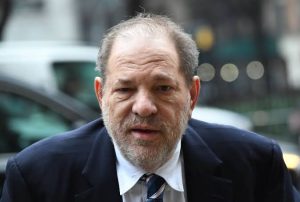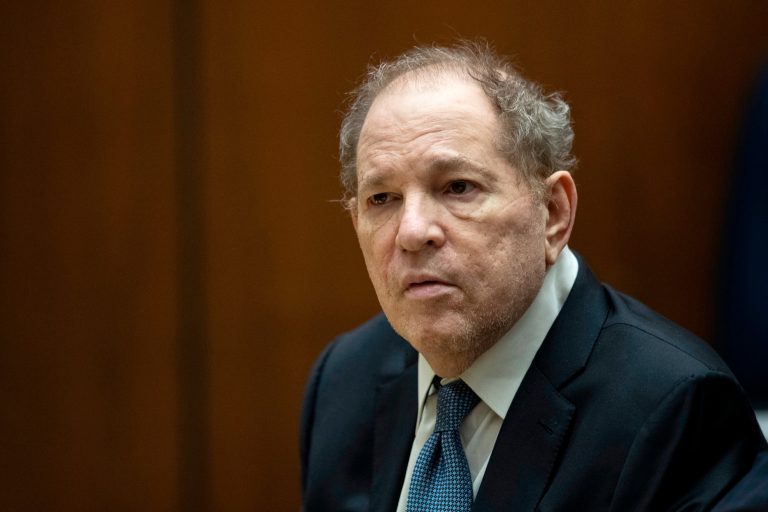Harvey Weinstein is an American former film producer and convicted sex offender.
Early life and Education 
Weinstein was born on March 19, 1952, in the Flushing neighborhood of Queens, New York City, to Max Weinstein, a diamond cutter, and Miriam Weinstein, nee Postel. He was raised in a Jewish family, with his maternal grandparents immigrating from Poland. Growing up with his younger brother, Bob, they lived in a housing co-op named Electchester in New York City. Weinstein completed his education at John Bowne High School and briefly attended the State University of New York at Buffalo. During the 1970s, Weinstein, along with his brother Bob and Corky Burger, independently produced rock concerts under the name Harvey & Corky Productions in Buffalo. Their productions featured renowned acts like Frank Sinatra, The Who, Jackson Browne, and the Rolling Stones. A close friend, Jonathan A. Dandes, described Weinstein as “aggressive” and “consumed” in business matters. Although Weinstein attended the University at Buffalo from 1969 to 1973, he chose to focus on his business ventures and did not graduate.
Career
In the late 1970s, fueled by profits from their concert promotion endeavors, Weinstein and his brother established Miramax, an independent film distribution company named after their parents, Miriam and Max. Initially, Miramax focused on releasing music-centric concert films like Paul McCartney’s Rockshow.
During the early 1980s, Miramax secured the rights to two British benefit show films for Amnesty International. Collaborating with Martin Lewis, the original producer, the Weinstein brothers merged the films into one tailored for the American audience. This resulting film, The Secret Policeman’s Other Ball, debuted in May 1982, marking Miramax’s first major success. The movie not only raised substantial funds for Amnesty International but also elevated the organization’s profile in the United States.
Throughout the 1980s, Weinstein and Miramax continued to gain traction, particularly with arthouse films that garnered critical acclaim and moderate commercial success. Their breakthrough moment came in 1988 with the release of Errol Morris’ documentary, The Thin Blue Line, shedding light on the wrongful conviction of Randall Dale Adams, which ultimately led to his exoneration. This case drew national attention to Miramax.
In 1989, Miramax reached new heights with the release of Steven Soderbergh’s Sex, Lies, and Videotape, solidifying its status as the top independent studio in America. However, the same year, Miramax faced challenges when two of its arthouse films, Peter Greenaway’s The Cook, the Thief, His Wife & Her Lover and Pedro Almodóvar’s Tie Me Up! Tie Me Down!, received X-ratings from the MPAA, hindering their nationwide distribution. Weinstein’s subsequent lawsuit against the MPAA prompted the introduction of the NC-17 rating two months later, marking a significant development in film classification.
Miramax’s success soared, culminating in 1993 when Disney offered the Weinsteins $80 million for ownership of the company following the triumph of The Crying Game. The brothers accepted the offer, solidifying their influence in Hollywood and retaining control over Miramax. The subsequent year, Miramax achieved blockbuster status with Quentin Tarantino’s Pulp Fiction and the distribution of the indie hit Clerks.
The accolades continued as Miramax secured its first Academy Award for Best Picture in 1997 with The English Patient, followed by critical acclaim for films like Good Will Hunting (1997) and Shakespeare in Love (1998), which garnered multiple Academy Awards.
In 2005, the Weinstein brothers departed Miramax to establish their own production venture, The Weinstein Company (TWC), alongside industry heavyweights like Quentin Tarantino and Robert Rodriguez. However, controversies ensued, including legal disputes with filmmaker Michael Moore over profits from Fahrenheit 9/11.
Weinstein’s influence in the film industry was substantial, evidenced by his frequent mentions in Academy Award acceptance speeches, though he faced criticism for his business tactics. Peter Biskind’s book Down and Dirty Pictures shed light on Miramax’s contentious practices, including the editing and reshooting of films like 54 to cater to mainstream audiences.
Weinstein’s involvement in the distribution of Asian films in the United States was met with mixed results. Despite attempting to release English-dubbed versions of Shaolin Soccer and Hero theatrically, they performed poorly in test screenings, prompting Weinstein to opt for their original language releases. Similarly, his re-editing of Farewell My Concubine for U.S. distribution sparked controversy, drawing criticism from Cannes jury head Louis Malle for altering the film’s essence.
His handling of Princess Mononoke also drew attention, with director Hayao Miyazaki sending a clear message against any cuts to the film. Weinstein’s reputation for altering the visions of foreign filmmakers for commercial reasons extended to other projects like Mimic and Nightwatch.
Weinstein’s reputation for assertiveness and occasional outbursts became well-known, exemplified by incidents like putting a reporter in a headlock and berating director Julie Taymor and her husband during a disagreement over a film screening. Despite some repentance expressed in a 2004 interview, allegations of harassment, including hassling Sydney Pollack and Anthony Minghella’s widow, continued to tarnish his image.
In September 2009, Weinstein publicly opposed efforts to extradite Roman Polanski from Switzerland to the U.S. concerning a 1977 charge of drugging and raping a 13-year-old girl, to which Polanski pleaded guilty before fleeing the country. Weinstein’s stance, influenced by his company’s distribution of the film Roman Polanski: Wanted and Desired, raised questions about Polanski’s culpability. However, Los Angeles County District Attorney Steve Cooley reiterated that Polanski’s guilty plea indicated the commission of a crime, with additional serious charges pending.
Legal issues
In October 2017, The New York Times and The New Yorker published reports detailing allegations from over a dozen women accusing Weinstein of sexual harassment, assault, or rape. These revelations prompted numerous others in the film industry to come forward with similar experiences. Weinstein denied any non-consensual encounters. However, the fallout was swift: he was dismissed from his production company, suspended from the British Academy of Film and Television Arts, expelled from the Academy of Motion Picture Arts and Sciences, and resigned from the Directors Guild of America. He also faced criminal investigations by the Los Angeles Police Department for alleged rape, along with probes by authorities in New York and London for other assault allegations.
In the wake of these accusations, Weinstein’s wife, Georgina Chapman, announced she was leaving him, with their divorce finalized in July 2021. These revelations catalyzed a broader movement against sexual harassment and assault, known as the Weinstein effect. This movement, amplified by the #MeToo campaign, led to a surge of allegations across various industries, resulting in the swift removal of numerous powerful individuals from their positions of authority.
Further reporting by Ronan Farrow in The New Yorker revealed Weinstein’s use of private intelligence firms like Black Cube to suppress allegations against him. These firms allegedly employed tactics such as tracking and meeting journalists and actresses under false pretenses, including Rose McGowan, who accused Weinstein of rape.
Weinstein’s efforts to suppress allegations against him involved enlisting the help of various influential figures. He reportedly sought assistance from Woody Allen and Hillary Clinton to halt Ronan Farrow’s reporting on sexual abuse claims against him, but both declined to intervene. Weinstein also employed the services of Black Cube to silence journalists Megan Twohey and Jodi Kantor, with a Black Cube agent posing as a women’s rights advocate to manipulate Kantor. Additionally, there were allegations that Jennifer Siebel Newsom, wife of California Governor Gavin Newsom, aided Weinstein lawyer David Boies in attempting to silence accuser Rose McGowan through bribery.
In 2019, the documentary Untouchable was released, featuring interviews with several of Weinstein’s accusers. Legal action against Weinstein intensified when he was charged by the New York County District Attorney’s Office with rape, criminal sex act, sex abuse, and sexual misconduct involving two separate women in May 2018. He surrendered to the NYPD and was released on bail, with travel restrictions imposed. Despite pleading not guilty, Weinstein faced additional charges in Los Angeles for raping one woman and sexually assaulting another in 2013.
Following a trial in February 2020, Weinstein was convicted of criminal sexual assault and rape, but acquitted of predatory sexual assault charges. He was sentenced to 23 years in prison in March 2020 and stripped of his honorary CBE. Despite plans to appeal, Weinstein began serving his sentence at the Wende Correctional Facility in New York.
The legal saga surrounding Weinstein continued with the New York State Supreme Court’s Appellate Division, First Department upholding the verdicts and judgment on appeal on June 2, 2022. Despite a further appeal being granted before the New York Court of Appeals on August 25, 2022, the court found no basis for reducing Weinstein’s sentence.
In July 2021, Weinstein was transferred to Los Angeles and taken to the Twin Towers Correctional Facility. His trial in Los Angeles commenced in October 2022, where he faced 11 counts of rape, forcible oral copulation, and sexual battery. On December 19, 2022, Weinstein was found guilty of 3 charges, with convictions including rape, forced oral copulation, and third-degree sexual misconduct. He was sentenced to 16 years in prison on February 23, 2023.
Separately, on June 8, 2022, Weinstein faced additional charges when formally charged by the Metropolitan Police with two counts of indecent assault against a woman in London in 1996.
Case Overturned
On April 25, 2024, the New York Court of Appeals overturned Weinstein’s rape convictions, citing “egregious errors” made by the trial judge. The court ordered a retrial of the rape allegations, noting that the admission of testimony regarding uncharged prior sexual acts against individuals unrelated to the case served no legitimate purpose and prejudiced Weinstein’s defense. The decision to allow the appeal was based on the acknowledgment that these errors significantly impacted the trial’s fairness.
In response to the ruling, several actresses who had accused Weinstein of misconduct expressed disappointment. Ashley Judd emphasized the impact on survivors, stating that the decision was unfair and reflected ongoing challenges faced by women in confronting male entitlement to their bodies. Rosanna Arquette, another accuser, expressed disappointment, affirming that Weinstein’s conviction was justified. Rose McGowan, who accused Weinstein of rape, emphasized resilience and empowerment, asserting that despite the overturning of the conviction, survivors’ experiences and achievements cannot be erased.
The ruling prompted reflection on the complexities of the legal system and its impact on survivors of sexual assault, highlighting ongoing challenges in seeking justice.
Personal life
Weinstein has been married twice. His first marriage was to his assistant Eve Chilton in 1987, and they divorced in 2004. They have three daughters together. In 2007, Weinstein married English fashion designer and actress Georgina Chapman. They have a daughter and a son. Following the public disclosure of sexual harassment accusations against Weinstein in October 2017, Chapman announced her decision to leave him. They reached a settlement in January 2018, and their divorce was finalized in July 2021.
Weinstein was known for his activism on various social issues, including gun control, poverty, AIDS, juvenile diabetes, and multiple sclerosis research. Until October 2017, he served on the board of the Robin Hood Foundation, a non-profit organization dedicated to alleviating poverty in New York City, and co-chaired one of its annual benefits. He was a vocal critic of the lack of universal healthcare in the United States.
Politically, Weinstein was a staunch supporter and contributor to the Democratic Party, backing candidates such as President Barack Obama, Hillary Clinton, and John Kerry. He supported Clinton’s 2008 presidential campaign and hosted an election fundraiser for Obama at his home in Westport, Connecticut, in 2012.
Weinstein had a significant presence in the fashion industry, notably producing the fashion reality show Project Runway, which propelled designer Michael Kors, model Heidi Klum, and editor Nina Garcia to stardom. He played a key role in the revival of Halston, collaborating with Tamara Mellon, Sarah Jessica Parker, and stylist Rachel Zoe. Additionally, Weinstein obtained the option to revive the Charles James brand.
In his efforts to promote fashion, Weinstein encouraged celebrities cast in his movies to wear Marchesa, the label of his then-partner and later wife, Georgina Chapman. His production companies were frequently involved in fashion-themed movies, including Madonna’s W.E., Robert Altman’s Prêt-à-Porter, and Tom Ford’s A Single Man. Furthermore, stars from Weinstein’s films graced the covers of more than a dozen Vogue issues, further solidifying his influence in the fashion world.
Net Worth before legal issues
Estimated to be 20 million dollars


